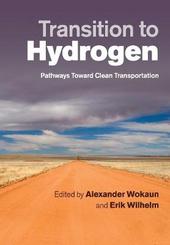
|
Transition to Hydrogen: Pathways toward Clean Transportation
Paperback / softback
Main Details
| Title |
Transition to Hydrogen: Pathways toward Clean Transportation
|
| Authors and Contributors |
Edited by Alexander Wokaun
|
|
Edited by Erik Wilhelm
|
| Physical Properties |
| Format:Paperback / softback | | Pages:280 | | Dimensions(mm): Height 245,Width 170 |
|
| Category/Genre | The environment
Alternative and renewable energy sources and technology |
|---|
| ISBN/Barcode |
9781108446488
|
| Classifications | Dewey:388.34 |
|---|
| Audience | | Professional & Vocational | |
|---|
| Illustrations |
Worked examples or Exercises; 16 Tables, black and white; 68 Halftones, unspecified; 21 Halftones, color; 68 Halftones, black and white; 61 Line drawings, black and white
|
|
Publishing Details |
| Publisher |
Cambridge University Press
|
| Imprint |
Cambridge University Press
|
| Publication Date |
1 March 2018 |
| Publication Country |
United Kingdom
|
Description
This book is a comprehensive and objective guide to understanding hydrogen as a transportation fuel. The effects that pursuing different vehicle technology development paths will have on the economy, the environment, public safety and human health are presented with implications for policy makers, industrial stakeholders and researchers alike. Using hydrogen as a fuel offers a possible solution to satisfying global mobility needs, including sustainability of supply and the potential reduction of greenhouse gas emissions. This book focuses on research issues that are at the intersection of hydrogen and transportation, since the study of vehicles and energy-carriers is inseparable. It concentrates on light duty vehicles (cars and light trucks), set in the context of other competing technologies, the larger energy sector and the overall economy. The book is invaluable for researchers and policy makers in transportation policy, energy economics, systems dynamics, vehicle powertrain modeling and simulation, environmental science and environmental engineering.
Author Biography
Alexander Wokaun is an ETH Professor and the Head of the General Energy Research Department at the Paul Scherrer Institute, Villigen, Switzerland. He received his Ph.D. from the Swiss Federal Institute of Technology (ETH) in Zurich and subsequently worked at IBM and Bell Laboratories. From 1982 to 1985, he directed a program on surface energy transfer processes at ETH Zurich. In 1986, he became full professor of physical chemistry at the University of Bayreuth, with a research program comprising studies of materials surfaces, catalytic reaction mechanisms and laser surface modification. Since 1994 he has led the General Energy Research Department of the Paul Scherrer Institute and taught in the Chemistry Department at ETH Zurich. Development of a sustainable energy system is at the focus of his research program, which comprises technologies for the use of renewable energies, energy storage, clean and efficient energy converters, and assessment of the environmental consequences of energy use. Since 2006 he has been a member of the Advisory Group on Energy of the European Union. He chairs the Steering Committee of the Competence Center Energy and Mobility which facilitates large-scale collaborative projects of ETH domain institutions. In July 2007 he was appointed Vice Director of the Paul Scherrer Institute for the area of Energy Research. Erik Wilhelm earned his Ph.D. from ETH Zurich in the Laboratory for Energy Systems Analysis at the Paul Scherrer Institute, Villigen, Switzerland. His focus is on powertrain simulation, hybrid control optimisation and heuristic vehicle design. He has an Honours Bachelor degree and a Masters in Chemical Engineering from the University of Waterloo, Canada.
|